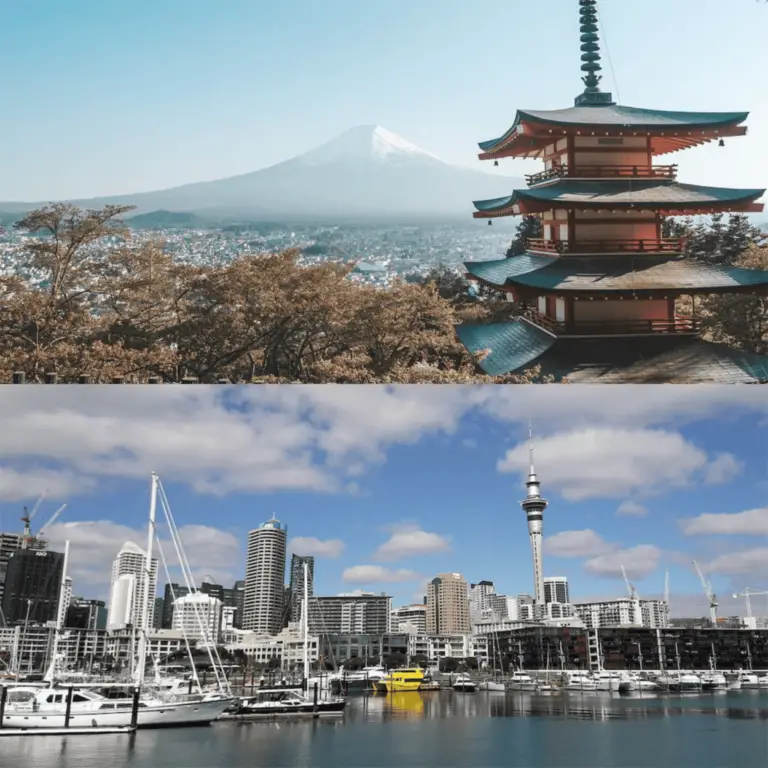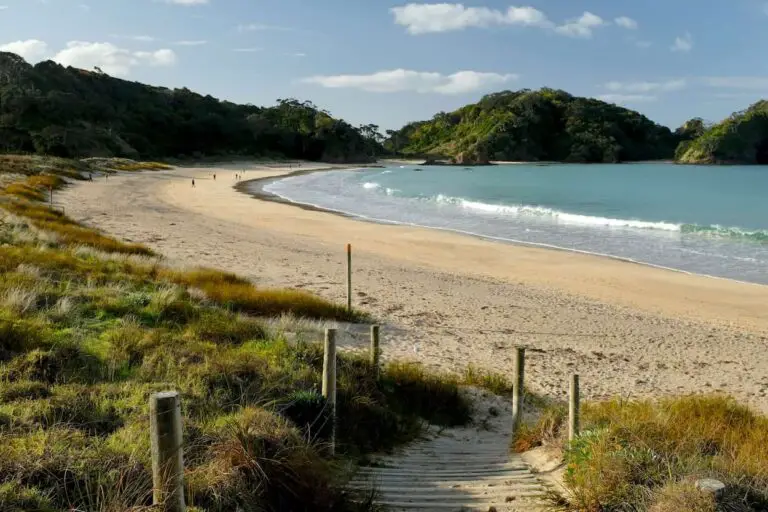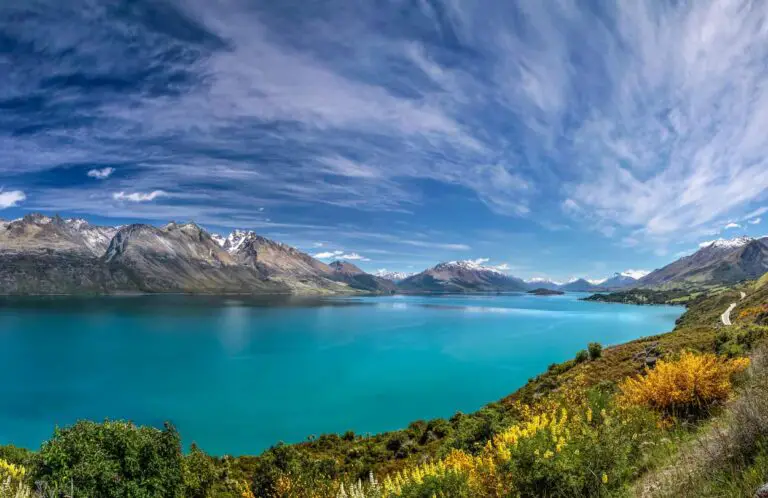Best Cities For Job Opportunities in New Zealand [2024]: Attention Job Seekers

New Zealand is a fairly small country with only a few cities which you can actually call a city. It can be tricky to pick a place to live if getting a decent job and having a balanced life are your goals. Hence, it’s crucial to assess the work options available in each city before you move any further.
Cities with the best job opportunities in New Zealand are:
- Auckland
- Christchurch
- Wellington
- Queenstown
- Dunedin
- Hamilton
- Nelson
We would recommend looking for a number of jobs in your industry in each city on websites like Trademe.co.nz or Seek.co.nz to get an idea of how many vacancies are out there. Overall, considering working in New Zealand can be an excellent decision if you have some skills and expertise.
New Zealand is continually growing and developing; hence, it’s constantly on the lookout for qualified workers. There are rapidly growing industries in cities like Christchurch, Dunedin, and Hamilton, where you can find a great job and enjoy a quieter, less stressed life than in Auckland, for example.
If you are wondering which city is best for getting a job in your field, read this guide on the 7 best cities to work in New Zealand.
Related: What is a good salary in New Zealand – learn how much you will make.
Salaries across various regions in New Zealand
If you are wondering about earnings across New Zealand, here is data on how much you will get paid in all central regions and major industries (median salaries).
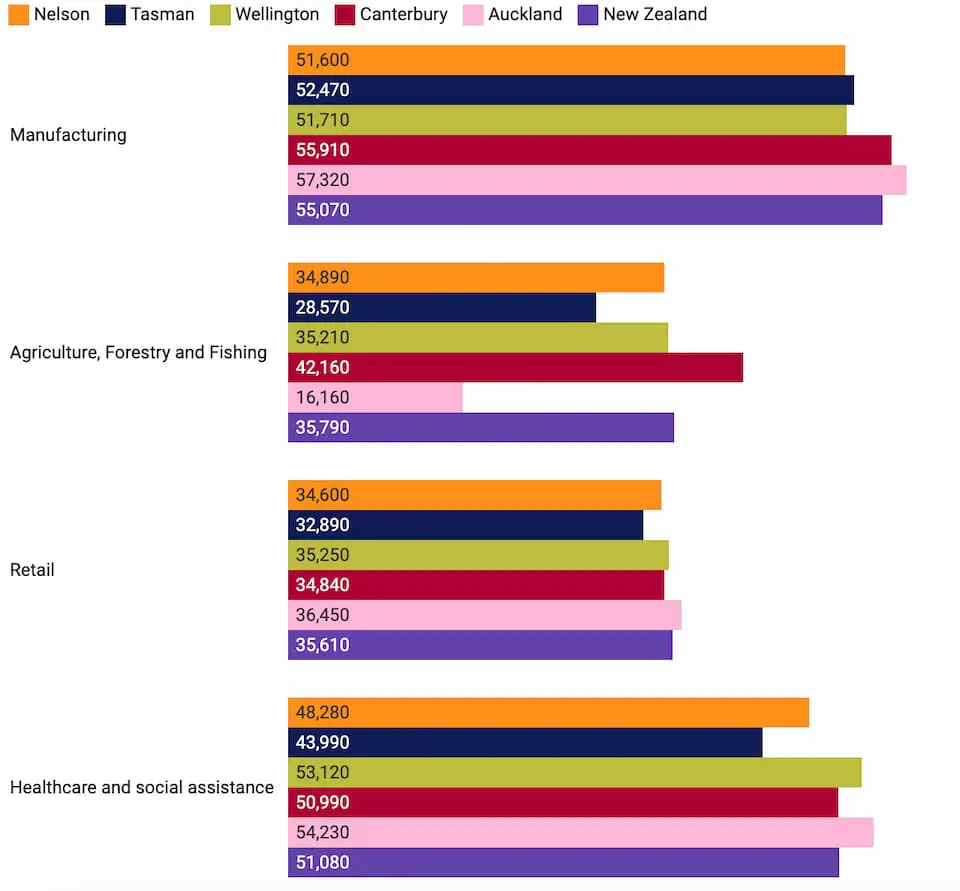

Which cities in New Zealand have the most jobs?
So where should you move to if getting a decent job in New Zealand is your number one priority?
1. Auckland
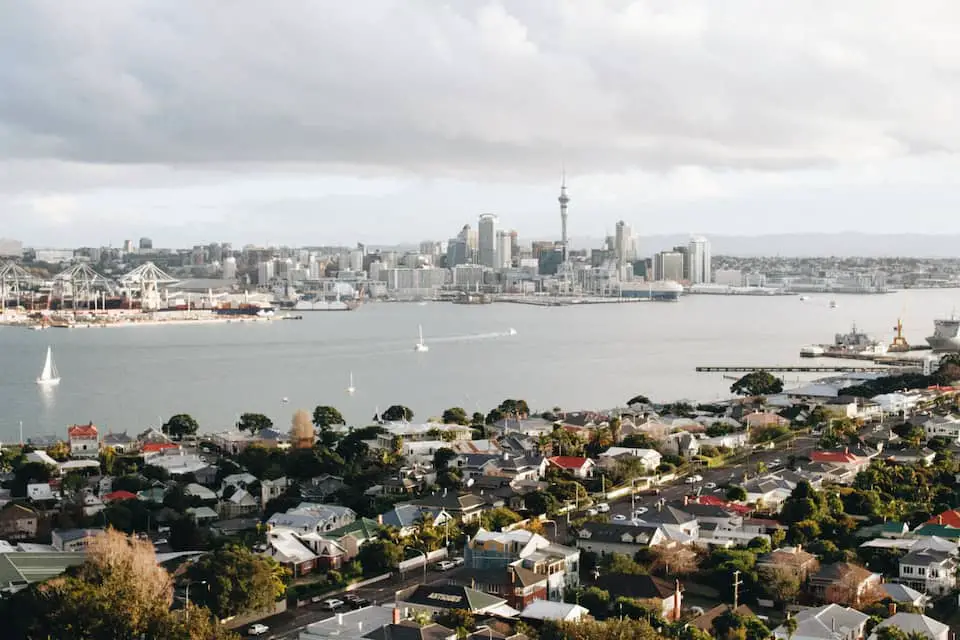
No surprise that Auckland is first on our list. It’s the largest city in New Zealand, with a population of about 1.72 million people.
Auckland holds first place regarding jobs, average salaries as well as the cost of living.
As of February 2023, there are 12,414 open vacancies in Auckland. It’s more than anywhere else in the country and three times more than in Wellington, for example. That comes to about 10.55 job ads for every 1,000 residents.
In 2022, the average Auckland household had an income of 146,509 NZD, while the national average was 117,786 NZD.
Moreover, the median wage for full-time workers is NZ$1,151 per week. Read more about salaries in Auckland in a dedicated article.
On average, the cost of living for a single person in Auckland is NZ$4,787 per month, and New Zealand’s average is NZ$4,226. So, you will need to make at least NZ$500 more to cover typical living expenses.
That said, Auckland is the primary driver of New Zealand’s economy, covering about 40% of the country’s GDP. It’s also home to major New Zealand companies.
Looking for a job? Check out the best recruitment agencies in New Zealand.
Particular professionals have better job opportunities than others. For instance, Auckland is great if you are in finance, insurance, management, and tech. Overall, most occupations are needed in New Zealand’s largest city.
Currently, there is rapid growth in the construction and technology/IT industries, as well as recruiting agencies.
Wages are also high for those in the finance and niche skilled work sectors.
Here is an overview of the main and economy-driving industries in Auckland:
- Professional, scientific, and technical services: science, architecture, engineering, design, law, accounting, advertising, etc. – 10,9%
- Financial and insurance services – 8,9%
- Manufacturing – 8,6%
- Wholesale – 7,6%
- Rental, real estate – 6,8%
- Information, media – 6,6%
- Construction – 6,5%
That said, the top growing sectors in 2022 were the professional, scientific, and technical services industries. They generated over a third of the total economic output. Other well-performing industries are wholesale and retail trade, transport, and construction.
So, if the situation with job opportunities and income in Auckland is great, what about living? How good is life in this city?
Firstly, Auckland is very popular among immigrants and expats; it has the largest percentage of the foreign population in the country. Besides, it offers a lot of free time and entertainment options that you won’t find in other cities.
If you’re looking for a busy city with vibrant nightlife, Auckland is a place to consider. You will also find plenty of beautiful beaches within an hour’s drive from the city.
In terms of public transport, you won’t find a better city. It has trains, buses, and ferries, which connect all suburbs with the city center.
However, it’s also known for painful traffic jams, so keep that in mind. Overall, it’s a great city to live in, whether you are single, a family, or a couple.
Pros of living in Auckland:
- Excellent job opportunities
- A lively and multicultural city
- Warm climate, yet it rains a lot
- The city is on the water
- Home to global companies
- Amazing eating-out scene
- Bustling social life
- Great public transport network
Cons of living in Auckland:
- High cost of living in the country
- Traffic jams
- The city is widespread
Don’t miss out on this article about the best cities to live in New Zealand.
2. Christchurch
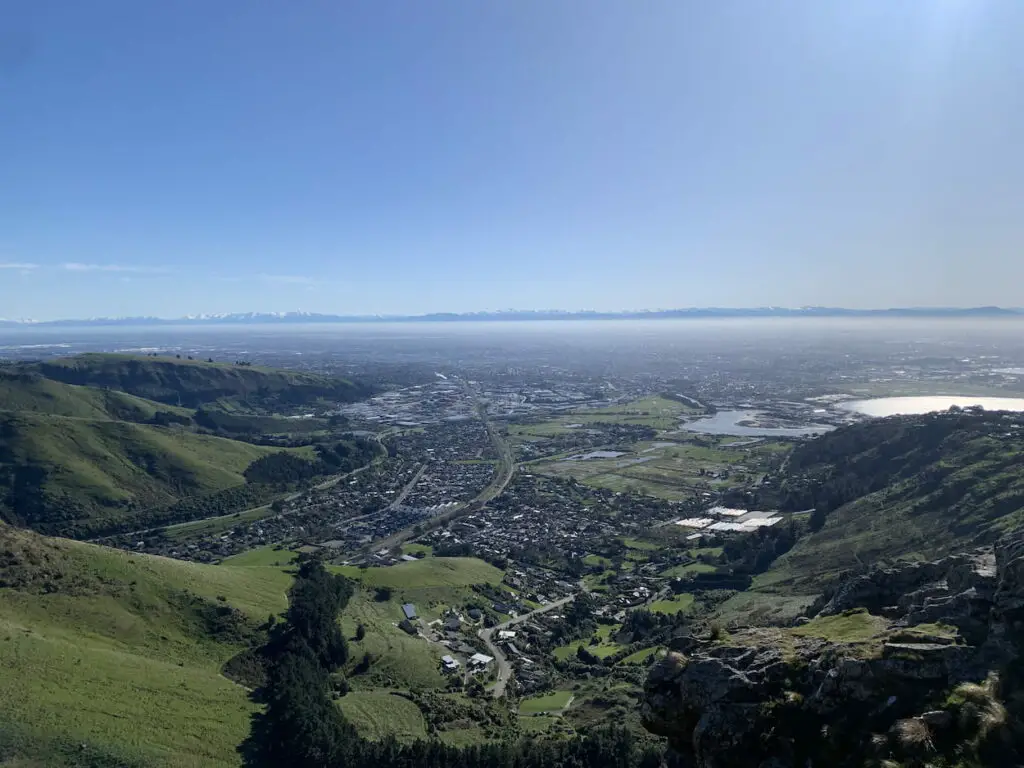
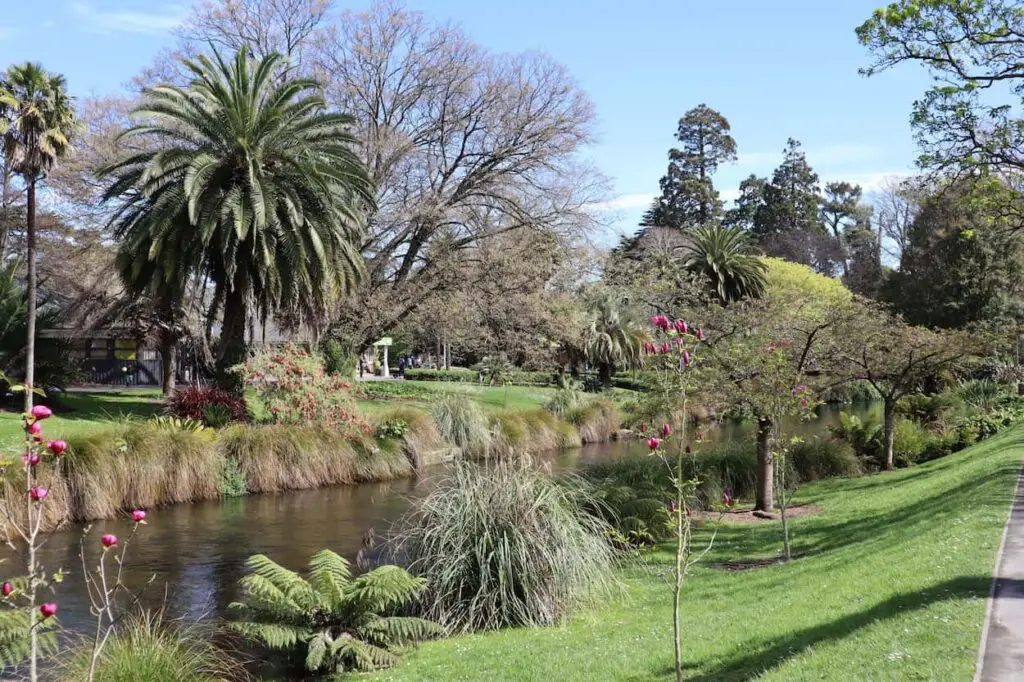
You probably expected to see Wellington in the second position, but we decided to showcase underrated Christchurch! It is the largest city on the South Island of New Zealand; hence, it has the most jobs in the region.
As of February 2023, there are 2,916 open vacancies in Christchurch. So, there are plenty of jobs available in a wide range of occupations.
With a population of about 369,006, Christchurch is officially the second-largest city in New Zealand and the largest city on the South Island. It’s the main city of the Canterbury region. A random fact about Christchurch is that it’s known as the “garden city.”
What are the most beautiful cities to live in New Zealand? Find out here.
Why it’s named this way? Christchurch has more than 700 parks, 15 golf courses, and the Port Hills nearby. It gives you excellent walking, running, hiking, and biking opportunities. Besides, the mountains and other South Island attractions are very close, making it an ideal place for the outdoors.
As a bonus, Christchurch gets much less rainfall compared to Auckland, for example.
The city is pretty flat on itself, making it great for cycling and biking. This way, you don’t need to use a car regularly.
This place is great if you want to live in a quiet residential area but still be very urban with plenty of options to shop, eat and entertain.
Another very crucial point for living and working in Christchurch is its low cost of living. However, salaries aren’t significantly lower than in Auckland. That way, you can save a good junk of your salary while living in Christchurch.
Another bonus is that the city was rebuilt after the earthquakes in 2011, so there are a lot of new buildings.
Besides, Christchurch is a very popular destination among Europeans, probably due to the climate, which is very similar.
Read more about Christchurch.
Since the city is still actively rebuilding, all jobs in the construction industry are in high demand, including welders, bricklayers, plumbers, and carpenters but also project management roles.
It’s a true goldmine for construction as Christchurch offers very competitive salaries but low rental prices. Thus, you can rent a decent sizes house at a good price to accommodate you and your family.
That said, the Canterbury region in total also has a significant agriculture and manufacturing sector.
Below you can see some of the best industries to work in Christchurch and the number of employees in a relevant area:
- Health care and social assistance (28,664 employees)
- Manufacturing (25,742)
- Construction (25,153)
- Retail Trade (24,961)
- Professional Scientific and Technical Services (21,069)
- Accommodations and food (15,926)
- Financial and insurance (4,715)
Moreover, in this graph, you can also see the main industries that are driving the economy of the entire Canterbury region and Christchurch:
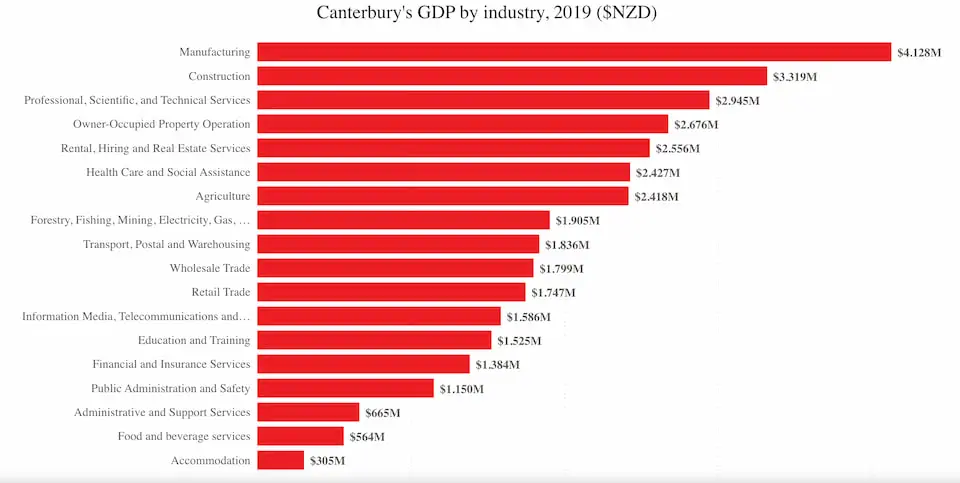
Here are some examples of average salaries in Christchurch:
| Job | Salary range | Average |
|---|---|---|
| Operations manager | NZ$56k – NZ$122k | NZ$80,673 |
| Project manager | NZ$62k – NZ$122k | NZ$89,461 |
| Quantity surveyor | NZ$54k – NZ$108k | NZ$75,966 |
| Accountant | NZ$44k – NZ$78k | NZ$55,943 |
| Software engineer | NZ$54k – NZ$94k | NZ$67,675 |
| General / operations manager | NZ$61k – NZ$148k | NZ$87,498 |
| Software developer | NZ$50k – NZ$87k | NZ$66,735 |
Pros of living in Christchurch:
- Affordable rentals compared to other cities
- Easy to get around, even with a bicycle
- Excellent universities and schools
- Plenty of jobs in the construction
- Good public transport
- Temperate climate, similar to European year-round
Cons of living in Christchurch:
- A possibility of earthquakes
- Winters are cold
- Quite far away from other main cities
- Jobs might be limited in some industries
3. Wellington

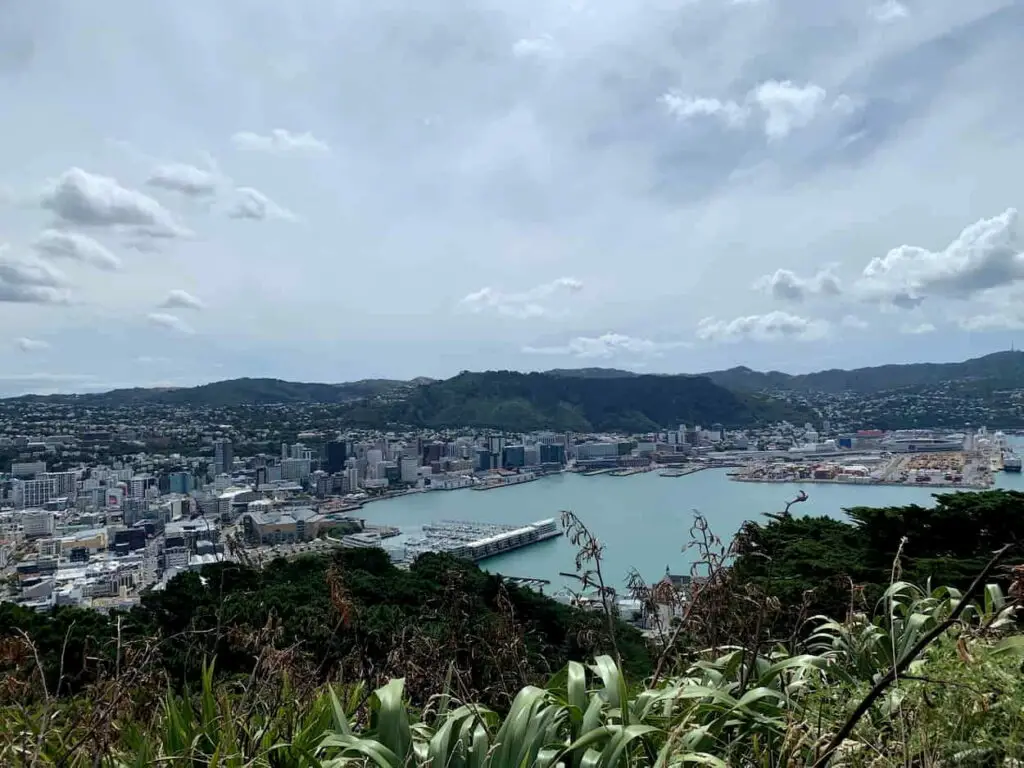
Wellington is the capital of New Zealand and is the third largest city on our list. Currently, about 212,000 people are living in the cultural hotspot of the country. As of February 2023, there are 4,330 open vacancies in Wellington. The city offers the best job opportunities for people with art skills.
The main thing which differentiates Wellington from Christchurch and Auckland is the hilly landscape of the city, and the way houses are built on hills. It might remind you of San Francisco.
Generally, Wellington is a very compact city making it perfect for someone without a car or if you want to have everything accessible in a matter of minutes.
Although Wellington is mostly popular among creators, everyone will have a chance to get a job there. This can be everything from bankers to software engineers. Since Wellington is the capital of New Zealand, there are plenty of positions in the government.
Wellington is the best city on our list if you are young, creative, and looking for entertainment, as it offers a lot of it!
That said, the best jobs you can work in Wellington are usually in the following sectors:
- Science and tech
- Government
- Healthcare
- Finance
- Real estate
- Telecommunications
- Education
- Trade
- Construction
Here are some examples of average salaries in Wellington:
| Job title | Range | Average |
|---|---|---|
| Software developer | NZ$53k – NZ$98k | NZ$68,809 |
| Executive assistant | NZ$54k – NZ$79k | NZ$67,839 |
| Operations manager | NZ$55k – NZ$128k | NZ$80,349 |
| Project manager | NZ$63k – NZ$140k | NZ$93,360 |
| Data analyst | NZ$52k – NZ$89k | NZ$66,713 |
| Accountant | NZ$46k – NZ$85k | NZ$60,069 |
| CEO | NZ$93k – NZ$253k | NZ$153,200 |
Pros of living in Wellington:
- Many job opportunities
- Young and vibrant atmosphere
- Compact size
- High salaries
- Close to nature and outdoors
- Excellent public transportation
- Great work/life balance
Cons of living in Wellington:
- Very windy
- A lot of rain
- Expensive rent
4. Queenstown
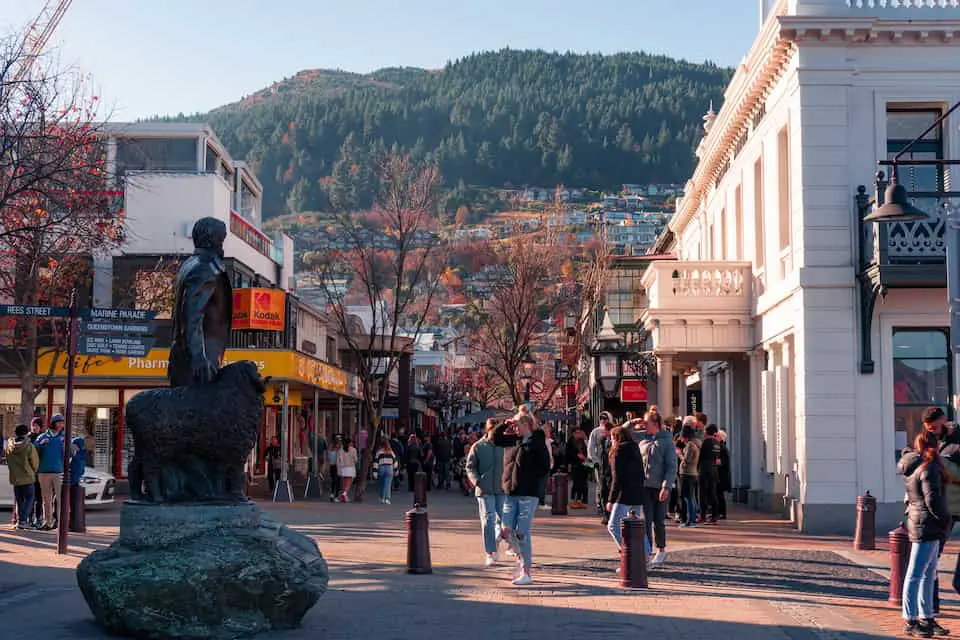
Although the population of Queenstown is relatively small (about 47,700), over one million tourists come to visit each year. It’s the true adventure capital of New Zealand and is known around the world for its winter and extreme sports.
If you are an outdoorsy person and love to spend time in the mountains, Queenstown is a place to be. It’s excellent for activities like skiing, snowboarding, mountain climbing, mountain biking, bungy jumping, and whitewater rafting.
There is also a good chance of finding a job related to your hobby. That said, most job opportunities are related to tourism, sports, and hospitality. If you are looking for a position in these industries, there is no shortage of jobs, meaning you will get one in no time.
At the moment, there are only about 639 jobs available in Queenstown. Most of them are related to accommodations, food, and other services for tourists. It might be challenging to find a job if you aren’t involved in the tourism industry, but there is still a chance.
Another positive about Queenstown is its weather; the summer is warm and dry, while snowfall is common in winter.
The primary industries that drive the economy in Queenstown are:
- Accommodation and food services – 13,4%
- Construction – 12,8%
- Rental, hiring, and real estate services – 10,4%
- Professional, scientific and technical services – 9,2%
- Retail trade – 7%
- Arts and recreation services – 4,9%
On the graph below, you can also see the number of total companies in Queenstown by industry. That gives you an idea of how many potential employers you will have:
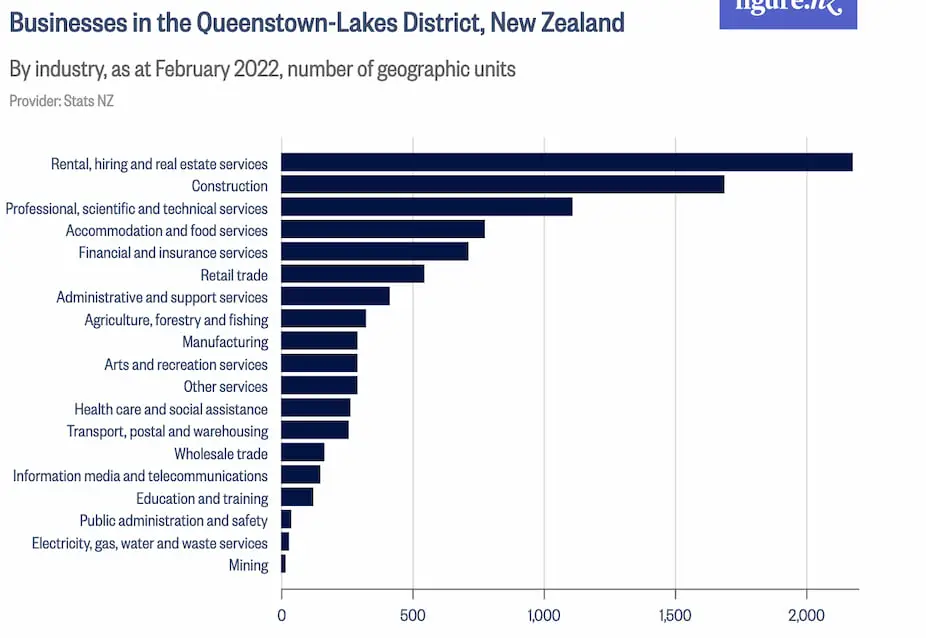
When it comes to earnings in Queenstown, the mean annual earnings per person is NZ$60,198 for 2022. At the same time, this number is higher across New Zealand in general (NZ$69,585).
Average salaries for some typical jobs are as follows:
| Job | Pay range | Average salary |
|---|---|---|
| Operations manager | NZ$50k – NZ$126k | NZ$71,877 |
| Quantity surveyor | NZ$53k – NZ$124k | NZ$71,216 |
| Retail store manager | NZ$44k – NZ$71k | NZ$59,283 |
| General / operations manager | NZ$62k – NZ$127k | NZ$75,497 |
| Civil engineer | NZ$59k – NZ$131k | NZ$85,000 |
| Accountant | NZ$46k – NZ$86k | NZ$60,678 |
| Project manager | NZ$74k – NZ$101k | NZ$90,000 |
Pros of living in Queenstown:
- Low unemployment rate
- Beautiful scenery
- Plenty of outdoor activities
- Pleasant climate
Cons of living in Queenstown:
- Jobs are mainly in the tourism and hospitality industry
- High cost of living
- Hard to find decent accommodation
- Expensive housing
- Shortage of housing
5. Dunedin
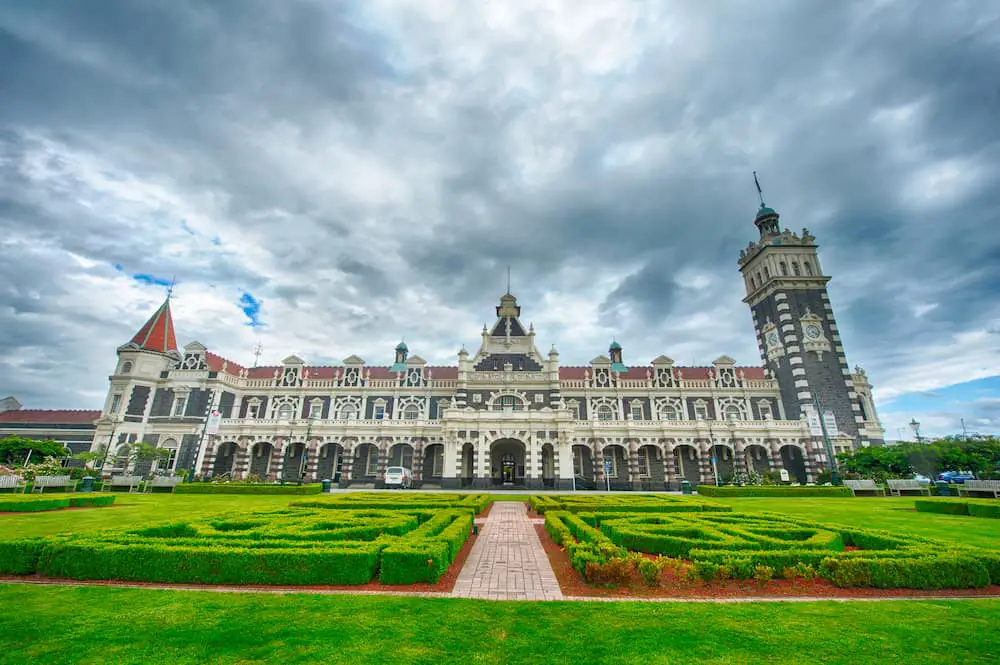
With a population of about 128,800 people, Dunedin is the second-largest city on the South Island and the largest in the Otago region. As of February 2023, there are about 702 jobs available in Dunedin.
Dunedin has a port; hence, there are some jobs in logistics available. Generally, it’s a pretty industrial city with food and beverage processing, construction, and machinery and equipment as the primary industries.
Dunedin is also a regional center for finance and commerce, and healthcare, tourism, engineering, retail, and other services contribute to its economy.
The weather in Dunedin is very close to European, with four defined seasons. Besides, the cost of living is very reasonable, making it a great place to work and live.
The main industries driving the job market in Dunedin are:
- Manufacturing
- Publishing
- Arts
- Tourism
- Technology-based industries
The main business areas as seen below:
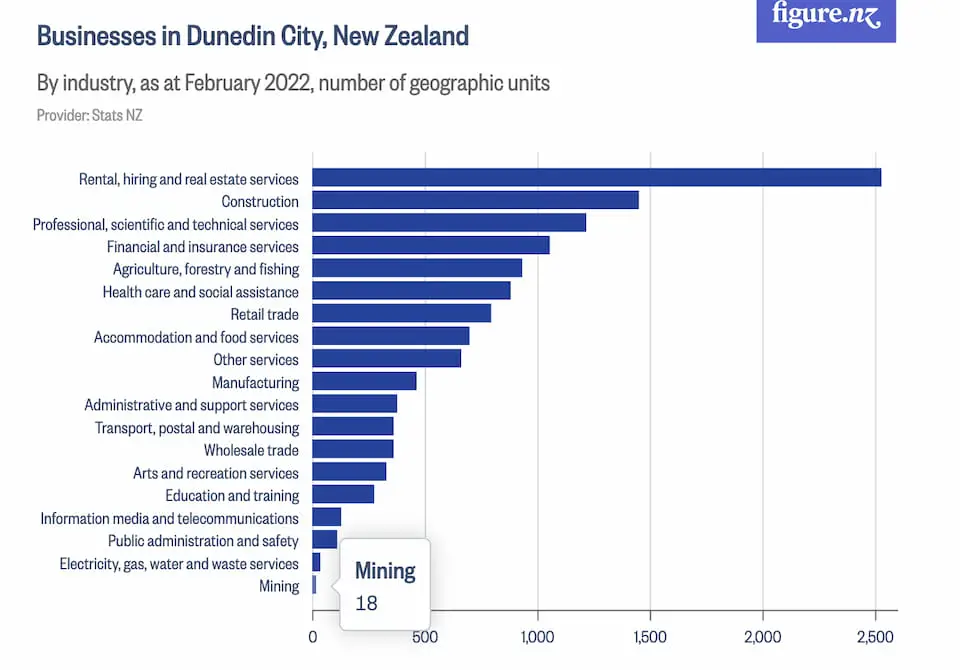
Moreover, some of the major employers of Dunedin include:
- Allied Press Ltd – Newspaper publisher
- Arthur Barnett Limited – Retailer
- Cadbury Confectionary Ltd – Chocolate manufacturers
- Calder Stewart Industries Ltd – Manufacturers and installers of Longrun roofing products
- Delta Utility Services Ltd
- Dunedin City Council
- Dunedin City Holdings Ltd
- Southern District Health Board
- Otago Polytechnic – University
- University of Otago
- Silver Fern Farms Ltd
- Wickliffe Limited – Print and supply chain management solutions
Source: www.enz.org.
Average salaries in Dunedin look as follows:
| Operations manager | NZ$48k – NZ$119k | NZ$79,130 |
| Accountant | NZ$43k – NZ$84k | NZ$52,486 |
| General / operations manager | NZ$62k – NZ$132k | NZ$88,983 |
| Software engineer | NZ$48k – NZ$98k | NZ$67,665 |
| Physiotherapist | NZ$49k – NZ$66k | NZ$58,041 |
| Office administrator | NZ$40k – NZ$61k | NZ$51,995 |
| Insurance broker | NZ$51k – NZ$87k | NZ$61,407 |
Pros of living in Dunedin:
- Affordable and plentiful housing
- Small and compact city
- Beautiful nature around
- Many jobs are in high demand
Cons of living in Dunedin:
- Cold winters
- Isolated location
- Limited job opportunities
6. Hamilton
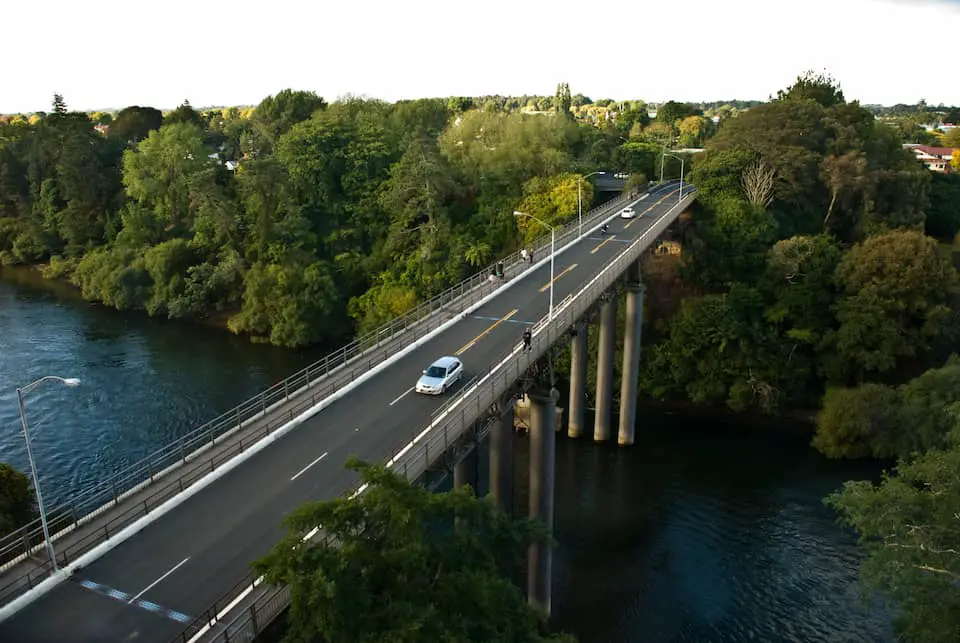
With a population of about 169,500, Hamilton is a decently sized city and the largest in the Waikato region. As of February 2023, there are about 1,305 jobs available in Hamilton. Significantly more than in above mentioned Dunedin.
One of the benefits of living and working in Hamilton is its location, as the city lies right between Auckland and Tauranga.
However, it’s a landlocked city. Hamilton doesn’t have either mountains or sea or lake. Before you move there, you certainly need to visit a city and estimate whether it can be a good place for a permanent settlement.
As a benefit, it’s a young city, thus, has a youthful population – around half of the residents are less than 30 years old. Here are some interesting facts about Hamilton:
- It’s New Zealand’s largest inland city.
- About 75% of its population is of European descent, and 19% are Maori.
- Average temperatures are 18 celsius in January and 9 celsius in July.
- There are 145 parks and gardens and 63 sports areas.
- The longest river in New Zealand, the Waikato, flows for 16 kilometers through the city.
From magnificent parks and gardens to a thriving cultural precinct, the city offers a vibrant combination of fine dining and nightlife options as well as an eclectic mix of leisure, lifestyle, and activity choices.
Some highlights about the economy and job opportunities in Hamilton are:
- It posses important for the country’s agricultural and pastoral areas
- The dairy industry has a high significance in Hamilton and Waikato region
- There are several science research facilities
- The city is also at the center of the upper North Island’s developing road network, meaning many jobs in road construction are available
If you are wondering about salaries in Hamilton, they are slightly lower than in the areas we listed before, about NZ$1,122 weekly for full-time workers. However, the cost of living is also lower.
For instance, houses and rents in Hamilton are 20% to 25% less expensive than in Auckland.
Here are examples of average salaries in Hamilton in 2023:
| Job | Pay range | Average salary |
|---|---|---|
| Operations manager | NZ$54k – NZ$119k | NZ$79,724 |
| Accountant | NZ$42k – NZ$91k | NZ$53,622 |
| Office administrator | NZ$43k – NZ$60k | NZ$48,730 |
| Project manager | NZ$61k – NZ$128k | NZ$94,133 |
| Software developer | NZ$50k – NZ$92k | NZ$77,323 |
| Chief executive officer (CEO) | NZ$88k – NZ$212k | NZ$149,837 |
| General / operations manager | NZ$58k – NZ$147k | NZ$98,585 |
With 6.28 job opportunities per 1,000 residents, it’s not exactly the most abundant job market in New Zealand.
Today, however, Hamilton is on the rise, with many locals and foreigners moving over there mainly due to the affordable house prices. While you will need around NZ$1,000,000 to buy a home in Auckland, in Hamilton, NZ$600,000 would be enough for two bedrooms.
Moreover, Hamilton is also only an hour and a half from Auckland International Airport. So, it’s not an isolated city compared to some on our list.
Pros of living in Hamilton:
- Affordable housing for buying and renting
- Favorable location – just between Auckland and Tauranga
- Wide range of jobs
- The longest river in the country
Cons of living in Hamilton:
- Landlocked city
- Limited access to nature and ocean
7. Nelson
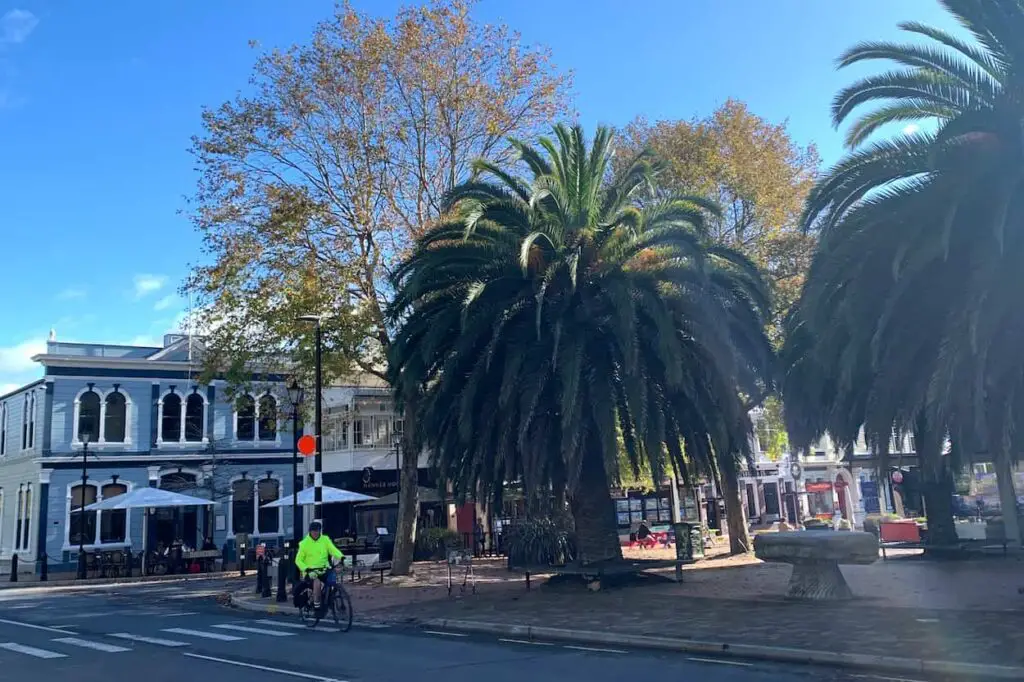
Nelson is known as the sunniest city in New Zealand. With a population of 50,880, Nelson is still a pretty large city for a South Island.
If we were describing Nelson, it’s a cozy, artsy, relaxed coastal city on the top of the South Island, and is perfect for a quiet family life. Nelson is great for mountain biking, hiking, and swimming, as it has scenic beaches nearby.
Don’t forget about the mind-blowing Abel Tasman National Park, which has some of the most picturesque beaches in the country.
When it comes to employment and careers, in February 2023, there were about 406 open jobs available in Nelson. Not exactly a lot, we know.
Moreover, the last NZ Census from 2013 estimated that there were about 5,622 businesses with 24,940 employees and 6,446 companies with 18,950 employees in the Tasman region.
Major industries you can work in Nelson:
- Manufacturing – 11,1%
- Construction – 8,2%
- Professional, scientific and technical services – 8,1%
- Healthcare and social assistance – 7,7%
- Rental, hiring and real estate services – 7,1%
That said, most people are employed in production industries, such as agriculture, horticulture, forestry, and fishing.
The largest employment areas in Nelson by category:
- Cafes and restaurants
- Hospitals
- Supermarkets and grocery stores
- Construction
- Seafood processing
- Apple and pear growing
- Primary education
- Accommodation
- Road freight transport
See more on the official website.
Some of the major employers in the city are:
- Nelson Marlborough District Health Board
- Nelson Marlborough Institute of Technology
- Nelson Pine Industries Ltd
- The New Zealand King Salmon Company Ltd
- Sealord Group Limited – 1,600 employees
- Talley’s Frozen Foods Ltd
- Global Forest Partners Weyerhaeuser New Zealand
Below you can see the average salaries in Nelson in 2023:
| Job | Salary range | Average |
|---|---|---|
| Operations manager | NZ$56k – NZ$120k | NZ$81,649 |
| Project manager | NZ$56k – NZ$99k | NZ$78,642 |
| General / operations manager | NZ$49k – NZ$126k | NZ$105,502 |
| Office administrator | NZ$42k – NZ$54k | NZ$48,737 |
| Chief executive officer (CEO) | NZ$97k – NZ$235k | NZ$154,266 |
| Registered nurse (RN) | NZ$45k – NZ$76k | NZ$65,000 |
| Personal assistant | NZ$45k – NZ$70k | NZ$49,851 |
Pros of living in Nelson:
- A lot of sunshine!
- Great climate
- Scenic nature around
- Close to the North Island – accessible by ferry or plane
Cons of living in Nelson:
- Relatively small city
- High land prices
- Wages are about 15% lower on average than North Island
- The population is mostly above 35 – 45 years old – very few young people
Best cities for IT jobs in New Zealand
If you are fortunate to be an IT professional, you will have plenty of choices on where to live in New Zealand.
Cities like Auckland, Wellington, Christchurch, and Hamilton have the most jobs, but thanks to your field, you can also get a remote position as a developer, for example, and work from anywhere.
Read this article about working in IT in New Zealand.
Auckland
Since Auckland is New Zealand’s largest city and home to the largest enterprises, you certainly will get a well-paid job as an IT guy/girl. The benefits of working in Auckland are the endless career opportunities and international environment.
Auckland’s tech sector is one of the fastest growing in New Zealand. Besides, 87% of all IT workers rate their current workplace highly, offering flexible working conditions, career development, and various non-financial benefits.
Not to mention it’s one of the world’s most liveable cities, making it attractive for foreigners and locals alike.
Here are the best IT fields to work in Auckland:
- Interactive technology
- Advanced engineering
- Digital content
- Wireless technology
- High-tech manufacturing
- Cyber security
- VR/AR
- Gaming and mobile
- Geospatial
- Telecommunications
At the moment of writing, there are 1,103 open vacancies in informational technology in Auckland.
Wellington
Yes, Wellington is New Zealand’s capital but a very compact city at the same time. It offers plenty of jobs, especially in companies headquartered in CBD.
Wellington is the best New Zealand city for young people as most of its population is in their late 20-s and 30-s. This city offers a great mix of urban and suburban life in proximity to nature. You will enjoy it!
As an IT professional, you will have a range of job opportunities across the number of tech companies that are based in Wellington.
Moreover, New Zealand’s capital offers some of the highest median salaries in IT, averaging NZ$95,000 per year.
As of March 2023, there are about 595 IT jobs listed on Seek.co.nz in Wellington.
Christchurch
Today, Christchurch is one of the most underrated cities in New Zealand. Few people know of its young, urban, lively, and energetic vibe. In addition, there are plenty of jobs and houses to choose from.
While in the cities listed above, you might experience difficulties in finding a home, it’s not the case with Christchurch. The housing is abundant and affordable. Plus, the city is flat like the Netherlands so you can cycle everywhere.
Surprisingly but remotely located, Christchurch is home to many technology businesses, including software, hardware, and electronics companies, ensuring there are tons of IT jobs.
At the moment, Christchurch businesses have 246 open vacancies for IT professionals.
Some other cities where you might consider getting a job are:
- Tauranga
- Dunedin
- Palmerston North
- New Plymouth
- Rotorua
- Whangarei
Also check out our article on the worst cities in New Zealand.

